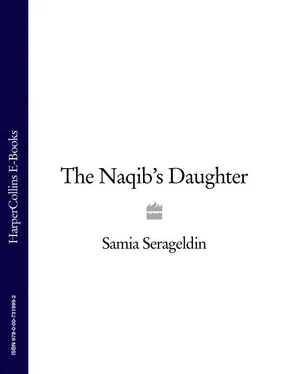The French clapped and called ‘Bravo!’ The Egyptians gasped and exclaimed ‘God is great!’ The flying ship rose still higher, leaning in the lazy wind, then seemed to stall as the wind died down. For a few minutes nothing happened; the great sphere hung in the air. The spectators began to fidget, while the French officers continued to nod and smile, encouraging the crowd to wait and see.
Then suddenly the basket detached itself from the sphere and came crashing down in flames. The crowd shouted in alarm and dispersed as the great balloon deflated and came floating down, scattering a quantity of printed leaflets.
Zeinab’s eyes went to the chief engineer, who was standing with his hands on his hips, shaking his head, circles of perspiration staining his shirt at the armpits. His frustration was unmistakable even at that distance, and for some reason she felt a pang of sympathy for that total stranger.
‘Come,’ she heard Shaykh Jabarti say, ‘this was no flying machine for transporting soldiers great distances. This was no more than a very large kite of the sort knaves at street fairs fly to entertain children.’
Then her maid was calling her and her brother. ‘Sitt Zeinab, come quickly, we must return to the house. Shaykh Bakri has invited the commandant of the Franj and his generals to a banquet tonight. And he has ordered that you make yourself ready should he require you to make an appearance.’
‘Me? I am to be called into their presence? Why?’
‘He must have a purpose in this, and it is not our place to question it. Now hurry!’
Nicolas headed on foot for the Ezbekiah, where he had been invited to attend the banquet given by Shaykh Bakri in honour of the commandant; the generals and the heads of the Scientific Commission were also invited. He was walking in the company of Geoffroy St-Hilaire, Dr Desgenettes and Ambassador Magallon, colleagues whose company he appreciated under ordinary circumstances, but on this occasion he was lost in his own gloomy thoughts, chewing over the disappointing outcome of the Montgolfière demonstration. He had worked like a conscript for the past two weeks – ever since Bonaparte had given him the order – and he had worked his loyal workshop heads nearly as hard, to get the balloon ready for the appointed date, the fateful festival of the Prophet. His heart had risen as the handsome new aérostat had inflated before his eyes, an imposing balloon thirteen metres in diameter, decorated with the inscription The Battle of Rivoli , and ringed with a civic crown and laurel wreaths. Ah, but would it fly and would it be stable?
He had not hidden his misgivings when the commandant and the generals returned from the ceremony of the Nile flood; he had told them flatly that he could not vouch for the performance of the hot-air balloon.
‘Could we not send up a soldier or two in the basket?’ Bonaparte had inquired. ‘There will be no lack of volunteers, I am sure of it.’
‘I refuse to risk the life and limb of any man.’
‘My dear Conté! At least let us send up a sheep or other animal, as the Montgolfier brothers did with their first experiments?’
Thank God he had stuck to his guns, Nicolas thought now as he was ushered into the double gates of the Moorish-style house where they had been invited; the much-vaunted airship had come undone and descended ignominiously, much to the alarm of tout Caire , all assembled for the spectacle, agog and agape. No one could claim he had not warned Bonaparte, but he expected his reception by the commandant to be rather chilly all the same.
So he was considerably surprised, after he and his party had been greeted in the outer courtyards by a gauntlet of servant boys proffering rose-water, and then had penetrated into an inner courtyard where most of the guests were already assembled, to be hailed from a distance by an unexpectedly good-humoured Bonaparte.
‘Conté! Come join us!’ Bonaparte beckoned him over to the head table, where he sat with his host, the chief generals and two other clerics. ‘This is the man of the hour, Shaykh Bakri. Let me introduce you to our chief engineer. Citoyen Conté, this is our host.’ A pale, lean-faced man, black of beard and brow, inclined his head and brought a well-tended hand to the front of his crimson kaftan in a gesture of welcome. Nicolas was struck by the sardonic eyes under the black turban.
‘And these are Shaykh Sharkawi, the head of the diwan; Shaykh Jabarti, the eminent historian; and the judge,’ Bonaparte continued, presenting the other three clerics at table. ‘Sit down, Citoyen.’
Nicolas took a seat between General Menou and Ambassador Magallon. He looked around the banquet hall: the hundred or so guests were seated on low benches lined with carpet cushions, and enormous brass trays were brought in and set up on tripods to serve as low tables for each group of ten or twelve guests. Serving boys came around with pitchers of rose-water and basins in which the guests rinsed their hands.
Bonaparte attempted some badinage with his hosts through the translator, Venture du Paradis, but it was heavy going; the Egyptian clerics sat sober as judges under their enormous Kashmir turbans. That, and the absence of wine, made for a decided lack of ambience. Ambassador Magallon, noting Nicolas’ discomfiture, whispered: ‘This Ottoman gravity is so antithetical to our French gaiety, is it not, Citoyen? But it is the rule on formal occasions, I am afraid.’
Meanwhile a procession of servants laid the large brass trays with plates of salad vegetables and flat rounds of bread. Before the guests could do more than contemplate sampling these aperitifs, they were pre-empted by the rapid succession of courses brought in by the servers and laid before them: meats in unfamiliar sauces, vegetables, pastries, creams, all generously seasoned with a variety of exotic spices. Conversation was abandoned altogether in the attempt to do justice to this bewildering and disorganized abundance. Some of the Egyptian convives dispensed with cutlery, using pieces of bread to scoop up mouthfuls of the various dishes; others, like Shaykh Bakri, attempted to wield spoon and knife in the European manner, no doubt in honour of their guests.
In the pause that followed, as the guests leaned back against the pillows, Bonaparte attempted to engage the notable clerics at table on the marvels of science – somewhat inopportunely, Nicolas felt, given the miracle-manqué of that morning – and exhorted them to revive the study of the sciences as their ancestors had done in the days of the Caliphs.
Shaykh Sharkawi, the head of the diwan, replied – through Venture du Paradis – that the Koran encompassed all knowledge.
‘Ah, but does the Koran teach you to cast a cannon?’ Bonaparte retorted.
He looked disconcerted by the solemn nods in the affirmative from the shaykh and his confreres. But Nicolas was not at all sure that they were all as gullible as they would appear. Bakri gave the impression of a sharp and worldly man under his pious airs. As for Jabarti, Nicolas had seen his dour face nearly every day at the Institute, peering with ill-concealed avidity at French instruments and poring over the Arabic translations in the library for hours on end. During the preparations for the aérostat exhibition he had been a constant presence, even if he deigned to ask few questions.
‘You know so much about Islam and Muslims, Commandant,’ Shaykh Bakri remarked, through the translator. ‘You should become a Muslim.’
Bonaparte seemed to take this in good spirit. ‘My dear Bakri, were you to issue a fatwa dispensing me from circumcision, and allowing me to indulge in alcohol and pork, I would consider it!’
Nicolas shifted in his uncomfortable position on the low bench; he was developing a cramp in his left leg, and hoped the banquet was drawing to a close. But the pièce de resistance was still to come. To each table was brought, on an enormous platter carried by two servers, a whole spit-roast lamb on a mound of rice with nuts and raisins. Then each lamb was carved open to reveal, stuffed inside it, a whole goose, and that in turn was stuffed with a duck, and the duck was stuffed with a whole chicken, and the chicken was stuffed with pigeons, all cooked together. By then Nicolas, and he suspected the other French guests as well, had lost all appetite, but out of politesse they applauded this culinary tour de force extravagantly.
Читать дальше












